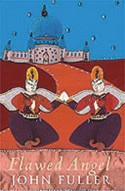|
Book Review
A Thousand and one Frights
AS Byatt
UNDER John Fuller's elegance is a grim and gleeful depiction of the relations between flesh and spirit, or between matter and the life that informs it. Flying to Nowhere, his 1983 fable, opens with a drowned white horse called Saviour, quite dead, whose flesh is hot with the new life of the maggots that consume it. It ends with the elixir of life restoring dead books to the reeds that made their parchment, and resuscitating the cattle whose
skins made the leather binding. The flawed angel of this new tale is a child born with half a twin buried inside him, the legs protruding from his navel, with a life of their own. At one point a legend is quoted that says that every man possesses an angel spirit who enters through the firmament. The child is the firstborn son and heir of the Akond of Taflat. He is cast out to die and becomes a wild boy in the forest. Later his mother surmises that his angel was too impetuous and "missed by an inch". A different aspect of Fuller's art is a civilised contemplation of social forms. Flawed Angel has much in common, oddly, with Fuller's most recent poems, Ghosts, which are both meditations on death as it gets closer, and examinations and celebrations of the relations of the generations - dead great-grandfather, grandfather, mother and newborn grandchild. One of the sonnets in Ghosts about the grandson is about the way his face forms its identity -
" ... the resolution
Of an enquiry of his own devising
A play of muscle that is its solution."
Flawed Angel is a philosophical tale in the style of Rasselas, and Fuller devises, with great ingenuity, a society that has tried to provide civilised solutions to eternal problems. War was terrible, so the people destroyed their weapons and turned to agriculture. The throne is inherited not on death, but in a series of ceremonies. The heir has three gifts - a horse at seven, a wife at 14, and the crown at 21. Retired Akonds leave the court and move away into the countryside. Much of the tale concerns the second child of the
 |
Flawed Angel title)
John Fuller (author) |
Akond, Blom, who is a fat, slow, contemplative boy who takes no pleasure in horse-riding, despite his first gift, a delicious little plump white mare, and who likes to play chess. There is also the problem of Blom's grandfather, the retired Akond, who lives in fear of death, which his retirement forces him to concentrate on, and neither looks after the peasants nor finishes his pleasure-dome, which is in ruins without having existed. One of the story's great pleasures is the character of the current Akond, in-Blemim, who is careful of conventions but ready to rethink wrong decisions and extricate himself from muddles. He is both comic and complicated. The country is visited by a small, threadbare detachment of soldiers from Napoleon's Egyptian army, who are looking for somewhere to settle and establish the rule of reason. When the firstborn reappears in a freak show, the surgeon among them prepares to operate on the "omphalocite". The Akond writes a long letter to Napoleon which is exquisitely funny and also wise, saying that the example of Colonel Marzipol "encourages me to fight all non-thinking wherever I find it". The construction of both fairytale and fable requires a coherent "secondary world" and Fuller rounds out details with ease and occasional surprise. There are other characters - the philosophical geologist who finds and tames the wild boy, 'l Isilik; the neighbouring girl, Ahraz, who watches 'l Izilik from a tree in her garden. She is taken away from her father, who dies of grief, to become the second gift, and dance before Blom before vanishing into the palace. There are easily villainous profiteers, and the mother and grandmother of Blom. There are many poems, which read like the translations we read of the poems in the Arabian Nights, some of them more singing than others, some of them almost nonsense rhymes. There is a wonderful description of a day-long performance of a dance between two men dressed as an elephant and a camel, which we see first through the horribly bored eyes of Marzipol, and then through the Akond's explanation that besides being an uproarious comedy the dance is a serious paradigm of Taflat. Which is between Mahomet and Brahma, between elephant and camel, on the periphery of belief and the periphery of empires. "You might say that we are at the centre of peripheries, where freedom is nourished; at the focus of the unusual where romance is an instinct."
One of the funniest scenes is the one where the French are invited to a banquet and offered a dish, designed for weddings, called "The Creation of the World". It is based on a pulverised eight-foot octopus, and its description recalls the mysteries of the living books in Flying to Nowhere. Marzipol sees in its depths "the following: beans sprouting, the eggs of the tiniest nectar-gathering birds cracking and hatching into the seething fluid, yolk acquiring brief feathers, spawn flirting the ghosts of tails, embryos appearing to smile as in the grateful heat of the hammam, womb blood trickling and clotting into suggestive shapes, grains flowering, litter unfolding tender limbs as if to swim up to the spoon, leaves fanning and a tiny tricolour in Japanese paper."
No other writer could make an ingenious primal soup in a civilised dish in quite this way. Flawed Angel is easy to read, but persists in the mind when it has been read, and asks to be thought about.
Source: The Guardian
Copyright
(R) thedailystar.net 2005
|
